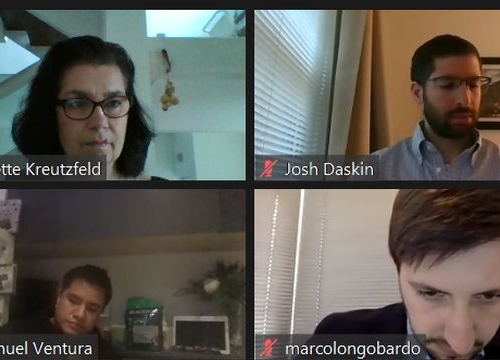Two-Day Conference Discusses the Status and Protection of Animals in Armed Conflict
29 June 2020
On 11 and 26 June 2020, academics and experts in the field of international humanitarian law, international criminal law, and animal law discussed online controversial issues related to the status and protection of animals in armed conflict in the context of a research project on this issue. Originally planned to take place at the Geneva Academy in March 2020, this two-day workshop had to be postponed due to the COVID-19 pandemic.
The Impact of Armed Conflicts on Animals
Wildlife populations remain neglected victims of armed conflicts throughout the world.
Although they rarely completely disappear, these populations usually decline, often significantly, during warfare. Over the last 50 years, certain species have even been vanishing at a particularly rapid rate in this context, with disastrous repercussions on the food chain and on the ecological balance of fragile ecosystems and protected areas, such as national parks. This is not surprising since, during this period, 80 percent of armed conflicts have taken place in countries – such as Afghanistan, Burundi, Central African Republic, Colombia, the Democratic Republic of the Congo, Iraq, Kenya, Mozambique, Nepal, Rwanda, Uganda or Vietnam – that contain areas of high global species diversity and where the maintenance of wildlife habitat is precarious. Moreover, belligerents take advantage of the chaos raised by war in order to poach protected species and to engage in the trafficking of expensive animal products. While generating billions of dollars each year – which are, in part, invested in warfare and the acquisition of weapons – such poaching and trafficking allow armed groups to grow and to reinforce their authority over local populations and disputed territory
About the Research Project
The research pursues three main goals. First, it seeks to create an inventory of the international legal framework available for the protection of animals in armed conflicts. Animals could be considered as ‘objects’, ‘specially protected objects’, ‘part of the natural environment’, ‘endangered species’, ‘weapons of war’, as ‘means of medical transport, search and rescue’, or even as combatants or part of the civilian population.
Second, the research project examines whether this legal framework is adequate in specific situations – in occupied territories, protected zones, sea warfare, and disaster situations – or in specific circumstances – when animals are used as tools in medical experiments. Third, the research evaluates to what extent the enforcement of the current legal framework adequately protects animals in terms of the repression of illegal conduct, reparation and rehabilitation. Ultimately, it seeks to make recommendations which aim at reinforcing all these aspects of the protection of animal during warfare.
The outcome of the research and its main recommendations will be published in early 2021 in an edited scholarly volume.
The project is hosted at the University of Geneva and at the Max Planck Institute for Comparative Public Law and International Law in Heidelberg. It is directed by Anne Peters, Director at the Max Planck and Robert Kolb, Professor at the University of Geneva and at the Geneva Academy. It is coordinated by Jérôme de Hemptinne, Lecturer at the Geneva Academy, and financed by the FNS.
Tadesse Kebebew and Joshua Niyo, teaching assistants at the Geneva Academy, co-author a chapter of this future book, and our Strategic Adviser on IHL and Senior Research Fellow Dr Annyssa Bellal has commented a chapter on animals as weapons.









